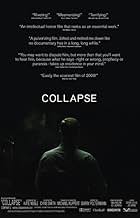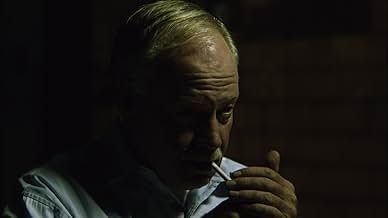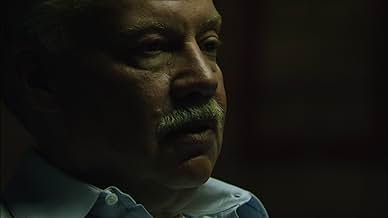A documentary on Michael Ruppert, a police officer turned independent reporter who predicted the current financial crisis in his self-published newsletter, From the Wilderness.A documentary on Michael Ruppert, a police officer turned independent reporter who predicted the current financial crisis in his self-published newsletter, From the Wilderness.A documentary on Michael Ruppert, a police officer turned independent reporter who predicted the current financial crisis in his self-published newsletter, From the Wilderness.
- Director
- Writer
- Star
- Director
- Writer
- All cast & crew
- Production, box office & more at IMDbPro
Featured reviews
All of his concerns are true, and some are even worse than he stated, but the very worst problem of all didn't even get a mention from him....that of global overpopulation that is the root cause of all the symptoms of our existence troubles that he did state.
To simplify......if the world's population was 20% of what it is now, the maximum sustainable figure, all of Ruppert's concerns for human existence would not be crucial for thousands more years when real solutions to the problems he stated might be available. But, we cry about the symptoms and don't care one bit about the cause so we continue to overpopulate all countries with uncontrolled new births, and are continually overburdened with resultant and mostly unsolvable problems as a result. Air, water, oil, food, and every single other problem of today that Ruppert stated has been caused by overpopulation, but still we cry only about symptoms, as Ruppert does, instead of the root cause of all our global problems....too many people being born with no controls on it and, what is much worse, no gov't or societal thought even being given to it.
As a result of that typical human stupidity and shortsightedness we are done, people, it is just a matter of time, and not that much time either, as your own young grandchildren will suffer badly as a result. But, still you don't care, so nothing is ever done about it. We don't deserve any more time on earth if we don't even care enough about protecting our continued existence by working on the cause of all of our problems.
Ruppert hits us right away with peak oil, arguing that though actual supplies have been kept hidden by governments, even Saudi Arabia, which has more than anybody, is starting to run out, and we're clearly now on the down slope of the bell curve. He says no substitute will really work, because all the alternative energy sources require too much energy themselves to produce. The planet's infrastructure is going to shut down; it's just a matter of time. Parallel to this is economic collapse, and he predicted the present crisis -- but expected it a year or so earlier. (Mighn't he be jumping the gun a little on this larger collapse?)
Ruppert is a survivalist, warning us all to live locally. He compares the fates of North Korea vs. Cuba when they lost the Soviet oil lifeline: Korea, a monolithic dictatorship, took a terrible hit. So did Cuba, but people pulled together there, raised crops locally in every available spot of land, and soldiered through so well they're now eating better than ever. He would have us take the same route: raise our own food, and horde gold -- the actual metal, not paper certificates -- and organic seeds, which in a world stripped of supply will become currency.
Ruppert is a smoker, and Smith doesn't hesitate to show every time he lights up. This looks like a marathon, and the interview -- with challenging, skeptical questions off camera from the director from time to time, not that this overconfident autodidact type ever wavers -- is so intense Ruppert actually breaks down and weeps more than once at the hopelessness of it all.
Smith's film is effective, and if it leaves you in some doubt whether the man is a kook or a visionary maybe that's part of the sense of radical unease you may justifiably feel walking out of the theater. Though Ruppert is made to seem both knowing and deranged, his talk is smart and well-informed. Clearly fossil fuels are finite. It all depends on transportation; it all depends on electricity. Without oil, these shut down. If seven gallons of oil go into the making of every tire, how are we going to make a whole new set of cars that run on something else? What about plastics? What about overpopulation? Ethanol is a sick joke, clean coal a lie. Even wind and solar power won't be possible because we won't have the energy to set up the power sources to utilize them. Global warming is just the planet's way of crying "uncle." When oil runs out, we'd better be ready before the infrastructures all collapse, or it's going to be hard going. We've got to downsize. It won't be easy.
It's rare that anybody thinks things through this far. No wonder the tears come. They come when he thinks of Barack Obama, a smart, good, honest man, he says, but someone so locked into the systems that we can't look to him for help. And that's very, very sad. The world's last, best hope is an illusion. (These are just a few of Ruppert's points: into these 82 minutes he condenses the fruits of decades of independent thought and study.)
Smith asks Ruppert what spiritual beliefs sustain him and he simply quotes the Bible: "money is the root of all evil." He asserts that we must find ways to live without growth and profit as guiding motives. The pervasive pursuit of money is the great, tragic human flaw.
This is an intensified and distilled Michael Ruppert, very effective but a bit misleading: he has other facets. In another setting glimpsed in the film but available in full on YouTube you can see Ruppert in a suit and tie giving a rambling, self-indulgent slide lecture full of many of the same interesting facts he likes to cite, including the government's reliance on drug trading, but very different in feeling and veering (though he denies this elsewhere) into 9/11 Truth territory. Collapse ends with captions noting that Ruppert, whose only friend seems to be his faithful dog, is having trouble paying his rent and may be evicted from his Culver City place.
But again on YouTube you find him being interviewed recently in Oregon, where he has moved, looking and sounding sunny and grounded and socially connected. If he's a kook, he has lots of friends, some of them quite respectable, and "Peak Oil" is a rallying cry for many. The YouTube videos show Ruppert isn't always the intense nut case Smith gives us. He suffers, he thinks too much, but he can have fun; he can talk without a smoke. He feels Ashland is a place among many (including much of South America) where sustainability will be possible when the paradigm shift comes. The end of he world won't be the end of the world. This may not totally convince you, but it will scare you. Rupert protests in Smith's movie that he deals in conspiracy facts, not conspiracy theories. He just may be right.
I would surely say - the most important movie for the 21st century man.
We live in a fairytale where everybody has a hope that the ''good'' will overcome the ''evil'' no matter how bad it is, because it will be better... in the end that's the way fairy tales end, don't they? The ugly truth is that no magical wonderland exists, there is only now and here and this movie shows you WHAT ACTUALLY IS NOW AND HERE.
I would like to have had more info on a lot of his quotes but I guess that would likely take an 80 minute documentary into like 3 or 4 hours (which I wouldn't have minded). I might just buy some if his books to take a look to see how much more in depth he gets on most of the topics he covers in this documentary.
For me, watching this, it was like it's about time. What I mean by that is finally someone who doesn't come across as a street corner preacher or a bona fide nut. This guy is just talking about real issues that matter, or at least they should matter.
Essentially what this film does is the equivalent of getting stuck at a bus stop listening to a guy who is convinced that the world is going to come to an end and that "they" are just keeping us in the dark for some reason. I don't mean this as negatively as it sounds but it is fair to say that this film doesn't hide the fact that at times Ruppert gets carried away with himself, doesn't always cope well with having the totally open stage that he has in the interview, gets passionate, is obsessive and does happen to make statements that (out of context) come off as paranoid and doomsday in nature. It is also fair to say that, unless you already share his mindset, that there will be several times during the film where he goes further than you will be willing to go or says things that either don't make sense, seem like a stretch or that you just plain disagree with.
Mostly the film lets him talk so it is only fair that these moments are left in the film because it does let us see that, being frank, Ruppert is obsessive and that perhaps some of what he says is exaggerated and extreme but this is not to say that he is 100% wrong. So while I personally don't agree with him on the imminent nature of the collapse of the oil reserves (or that they are significantly smaller than "they" are telling us), one cannot really argue that from plastics to fuel, we really have put all our eggs into the "oil" basket and that supplies are simply not infinite. Likewise, because all of our eggs are in one place, moving them may well be possible in small numbers but if we suddenly have no basket – we're going to have a load of broken eggs. At this level the film is engaging and provides plenty to think about and I think that Ruppert is at his best when he is talking generally because his basic points are hard to argue; it is only when he gets into specifics or gets tied up in details that he begins to say "they" too often or get a bit more emotional.
These moments hurt the film by hurting him, although in fairness since the documentary is technically about him, then it is all part of the film and is a good bit of balance. So yes, Collapse will lose you at some point but it will also engage you at many more; it isn't the most factual of documentaries nor is it the best in terms of structure but I found it mostly very engaging and it sent me onto news sites and opinion sites on the internet to read up on some of the less "opinion" related "facts" that it Ruppert presents. Worth seeing for its faults because it is engaging and provides much to think about, even if your conclusions may not lie as far out there as Ruppert's.
Did you know
- TriviaAccording to director, Chris Smith, they initially agreed the primary subject was supposed to be the CIA's connections to drug smuggling within the Iran-Contra affair, specifically Ruppert's collaboration with Pulitzer Prize-winning reporter Gary Webb's mid-1990's investigative series, "Dark Alliance." But Ruppert didn't want to talk about the CIA. Instead, he wanted to talk about peak oil, and its critical implications for the future.
- Quotes
Michael Ruppert: It's kind of sad because we as a species have become so disconnected from the Earth. We don't have any real contact with the Earth. We don't have any sense of its functions, its feeling, its seasons, its timings.
- ConnectionsReferenced in Film Junk Podcast: Episode 235: TIFF Report, Part 1 (2009)
- SoundtracksCollapse
Performed by Karli Larsen, Didier Leplae, Joe Wong
- How long is Collapse?Powered by Alexa
Details
Box office
- Gross US & Canada
- $46,964
- Opening weekend US & Canada
- $7,800
- Nov 8, 2009
- Gross worldwide
- $46,964
- Runtime
- 1h 22m(82 min)
- Color



















